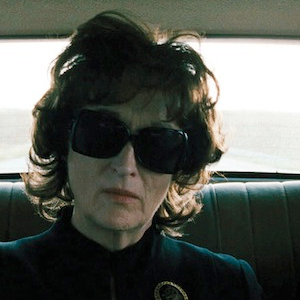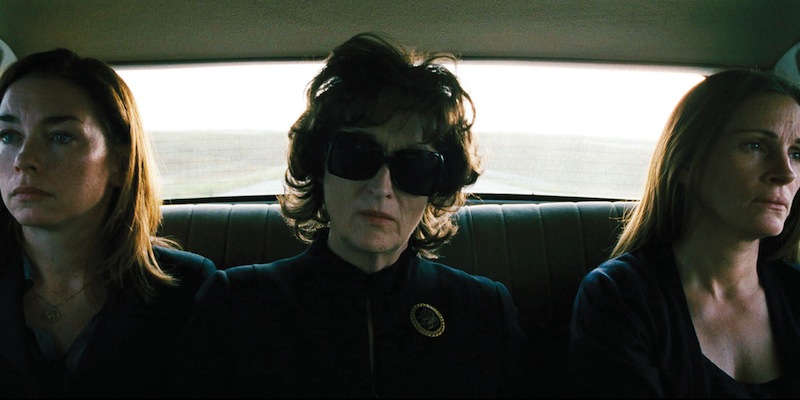August: Osage County Review
Directed by John Wells adapted from a screenplay by Pulitzer Prize and Tony Award winning playwright Tracy Letts, with an ensemble all star cast including: Julia Roberts, Meryl Streep, Benedict Cumberbatch, Chris Cooper, Sam Shepard, Juliette Lewis, Julianne Nicholson, Ewan MacGregor, Abigail Breslin and Dermot Mulroney.
‘Thank god we can’t tell the future’ sighs Barbara Weston (Julia Roberts), ‘we’d never get out of bed’. And it doesn’t get much better in Tracy Lett’s screenplay for the film August: Osage County which had its world premiere at TIFF 13. Based on the play of the same name, Director John Wells is mostly faithful to the play/screenplay where Lett’s dialogue carries the narrative. The camera has little to do but let the ensemble cast belt it out, and belt it out they do. There is nothing subtle about the dysfunctional Weston family: drug and alcohol abuse (not by the adult children but by their parents), spousal betrayal (by almost all), physical and verbal abuse, jealousy, envy and a bellicose insensitivity from ‘matriarch’ Violet Weston (Meryl Streep) whose behaviour is nothing short of an emotional ‘wrecking ball’, all in the name of good ol ‘truth tellin’. Of course the abuse and devastation, years of it, results in the suicide of patriarch Beverly Weston (Sam Shepard) which brings three wayward daughters home for their father’s funeral; an estranged husband Bill Fordham (Ewan Macgregor), a phony fiancé Steve (Dermot Mulroney) and the revelation that one of the sisters Ivy Weston (Julianne Nicholson) has fallen hopelessly in love with her dim-witted but sensitive cousin Little Charles (Benedict Cumberbatch). The wake dinner table becomes a ‘confessional’. You wouldn’t blame any of them for not wanting to get up the next morning.
All nuance is forsaken. In its place we get high pitched excoriating narrative where each of the characters jaw at each other over past and present transgressions. The viewer is barely given few moments to breathe before the next round of insult and injury. Letts has put his finger on the dynamic of a family that is dogged by drug and alcohol abuse for sure, but his characters have all seemingly hardened their wounded hearts and resolution, if you can call it that, comes in everyone driving off in a stink. Sisterhood under Lett’s pen is dark and unforgiving: Barbara is all strength and anger, Karen (Juliette Lewis) delusional and ditsy by choice, presumably to mask the horrible sorority and Ivy, the forlorn ‘old maid’, sweet but with an intellectual bite. The stock response to being injured it seems is to then in turn injure someone else. Traditionally this has been the sole domain of the shamed male; but this is a female, mid-western version of the Brothers Karamazov, drunken parent and bastard included, except there is no angelic Alyosha to redeem the family. Letts’ responds to family strife by giving us the american paradigm of individual strength in the face of personal adversity. This could have been called ‘The Self Destruction of the American Family’ as much as ‘My Way’. Letts’ thematically follows the great American playwrights O’neill, Miller, but most particularly Sam Shepard. It would be surprising if Letts didn’t have a lot to do with Shepard’s brief turn as the Weston patriarch — an overt acknowledgement of how much Shepard’s plays like ‘Buried Child’ and ‘True West’ have influenced and inspired him. But in Osage County, we are not given any resolution, emotional or otherwise, and as living theatre and cinema, this authentically reflects the state of the family in the 21st century, fractured and beset with impossible cultural legacy. If there is any message here, its that expectations of family over and against our individual frailties and desires will never find resolution. All we can hope for in the end is understanding. In Letts’ world one needs not only the strength to withstand the truth but also be prepared to tell it — a softer landing would be just a little more soothing. We don’t get it here.
There is an admirable quality to the film that has a lot to do with the Director Wells’ ability to channel several individual stars into a coherent ensemble cast. The dark humour is never forced or self conscious. Performances are superb across the board and this is also a credit to the script. Like Shepard’s best plays, the voices are authentic and it brings out some of the best work in recent memory from Julia Roberts; and Meryl Streep, as always, shows us the range of her extraordinary abilities to deliver a character no matter how complex. Chris Cooper as Charles Aiken (his grace at the wake dinner table is an absolute treat) and Benedict Cumberbatch as his son in a turn against recent character are also exceptional.
I’m not sure that Letts’ script doesn’t lose some of its emotional immediacy and depth in front of the camera, something that a great performance always delivers on a live stage. But for those who may never have the opportunity to see the play, this is almost as good, and the cast lives up to a courageous and difficult ‘no holds barred’ script.
Alfredo Romano
Shown at this year’s TIFF13 : Toronto International Film Festival.




